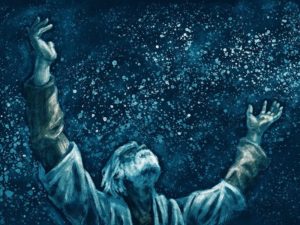
Our conduct matters. It seems such a simple statement. In today’s society, we see the opposite preached from the pulpit of secular media. “You do you, and I do me.” “Your truth is your truth, and my truth is my truth.” I saw someone post the golden rule yesterday in a comment on a news article, “do unto others as you would have them do unto you.” That person was told to keep their platitudes to themselves. I watched as another politician quickly distanced his own country from being a “Christian nation” to being rather a “nation that includes some Christians.” The more we watch society, the more likely we would be to agree that we are no longer a Christian nation.
For Christians, no matter what nation we find ourselves in, it should be a no brainer. God has promised us an inheritance, but it is one that comes with a cross. A cross has one purpose: it is an instrument that brings death. Paul reminds us today in the second reading that we are supposed to be dying to ourselves daily. Looking back at the Saints who have lived this way, following their example as they followed Christ, we are trying to crucify our desires and instead serve others. This Lent we travel through together is to remind us that we should indeed be carrying our crosses, not just for these 40 days, but every single day. Prayer. Fasting. Almsgiving. They are supposed to change us for the rest of our lives, and they will if we let them.
In the Gospel today we see Jesus revealed. It’s not that Jesus transformed himself into something else, but rather that the veil lifted between this temporal realm and the place where God is. Those men caught a glimpse of who Jesus is. Dazzling, amazing, awe-inspiring. We have the opportunity daily to encounter Him in the same way. In the Sacraments, especially in the Eucharist where we come face to face with Him body, soul, and divinity. In the Sacred Scriptures, in prayer, and maybe most often overlooked, in each other. Mother Teresa once said: “Seeking the face of God in everything, everyone, all the time, and his hand in every happening; This is what it means to be contemplative in the heart of the world. Seeing and adoring the presence of Jesus, especially in the humble appearance of bread, and in the distressing disguise of the poor.”
It’s tough to do. We are trying to see Jesus in other people, especially the ones we don’t like or who rub us the wrong way. Even with the host, that small piece of bread held up before us; our mind has trouble wrapping around it. I think that is the point of the encounter with God that Abraham had in the first reading. God took Abraham outside the tent and said: “Look up, count the stars if you can.” That seems a massive task on its own. The night sky is full of stars, impossible to count. Only we see from the reading that a little while later the sun began to set. God took him out in the sunlight when not a single star was visible. He showed Abraham that even though you can’t see it, and won’t see it in your lifetime, your descendants will be as numerous as the stars that you know to be there, but can never count.
He says the same thing to you and me about the cross. We may not be able to see the promise fulfilled or even the progress. Our days may seem to be filled with failures and weakness. It may look like we are getting nowhere and that our witness is falling on deaf ears. We must carry our cross anyway. One day the sun will set on our life, and we will see him transformed before our eyes. Every seed planted will have grown, every heart touched revealed. On that day we will look back and see where Jesus was all along, right there by our sides. Yes, on that day “he will change our lowly body to conform with his glorified body by the power that enables him also to bring all things into subjection to himself.”
Until that day we must see with eyes of faith, carrying our cross while remembering another saying of Mother Teresa: “God has not called me to be successful. He has called me to be faithful.” It is that sort of faith that we must have, that we too may be like Abraham; who when looking up at the sky believed and it was “credited it to him as an act of righteousness.”
